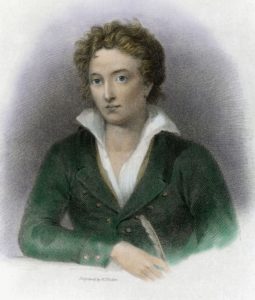
Percy Bysshe Shelley
Lord Byron had quite forgotten about his dinner invitation to the Darcys, as Shelley’s arrival had distracted him. They had not met in several years, and after warm greetings Shelley lost no time in freeing his mind about his first concern: the fate of Byron’s little daughter Allegra. The child’s mother, Claire Clairmont, lived with Shelley and his wife Mary, her half-sister, and she had come to Italy to try to see her child. Shelley represented to Byron Claire’s grief and longing for her daughter, and in the warm feelings consequent on his reunion with his friend, Byron was more liberal on the subject that was his wont.
“Why, Shelley, I do not mean to insist on keeping them constantly apart,” Byron said. “I assure you I am amenable to their being together, at least for some time. Only, Allegra is not with me now.”
“But you gave us to understand she was with you in Venice,” Shelley protested.
“So she is in Venice, but I thought that my house was not suitable for a nursery.” He smiled and waved his hand at two monkeys and a lynx tumbling on the floor.
“Where is she then?”
“I’ve put her with the Hoppners. They have children and have taken to my little Allegrina, and bring her to visit me here sometimes. But where is Claire? You must be aware that I very much prefer not to see her.” Her endless letters with their emotional pleas and unwanted, unbalanced expressions of her love for him, were distasteful to Byron in the last degree.
Shelley thought quickly. It would not further his mission to find a way to allow Claire to see Allegra, if Byron knew the truth: that Shelley had known the child was at the home of the British Consul and he had left Claire there, with her daughter.
“No, no. She is with Mary and the children at Padua,” he improvised.
“That is well. I will tell you what we will do, Shelley. You know I’ve taken a villa at Este, in the Euganean Hills – it is cooler there than here, in high summer. Suppose you all go and stay there for the rest of the season. Claire and Allegra can be together, and I can have time to myself to get on with my work. But you’ll stay with me for awhile, here, first? I have much to tell you about my Fourth Canto. It is going surprisingly well, very strongly expressed. I will read you the latest stanzas.”
“And I want to hear them, and have much to confide to you. In my new piece, Alastor, I’ve written about a poet’s loneliness, but the subject matter has made me feel rather lost. I am thinking that this renewal of friendship and the reunion of our creative minds will have a salutary effect upon me.”
“Just so. After all, how many poets of our caliber does one meet? Such meetings of true minds are too rare, and are to be celebrated, surely. And so, you like my Este plan, do you?”
“Oh! Certainly. It is extremely kind of you,” said Shelley, thinking feverishly about how he could write to Mary to take the children to the Hoppners’ Venice house, which would be an arduous journey of several days over the Appenines, in hot weather. But it had to be undertaken, and he could spend the intervening time with Byron.
“Then that is settled,” said Byron cordially. “Look here, I’ll summon my gondola, and we can go for a ride on the Lido beach. My horses are there, and a good ride and talk should be a tonic for you after your journey.”
“It would indeed,” Shelley agreed fervently.

On the ride their friendship was fully rekindled. It was a great refreshment to each to discuss his work with an equal poet and friend; and they shared mutual sympathy as to what they had personally endured while parted. Byron expressed his sorrow and anger that Shelley had lost custody of his older children, and Shelley sympathized with his irritation at the capricious Claire, and out of his fuller experience of parenthood, gave advice on how to manage Allegra, though both agreed that Claire was beyond management.
Airing their feelings was so exhilarating, Shelley could hardly wait to write about the new intensity of the friendship and what it meant to him. He planned the verse, “I, from this moment, should have formed some plan / Never to leave sweet Venice.” In Byron’s great palace, he was sure, his “wit and subtle talk” would cheer many a winter night.
But it was not to be. As they alighted from Byron’s gondola back at the Grand Canal, they were startled to discern visitors in the grand saloon.
Guiseppe, the manservant, met his Lordship as he alighted. “I am sorry, my Lord, for this unexpected confusion. But as you can hear, Mr. and Mrs. Hoppner have arrived bringing little Allegra to see you, and as you know, we are expecting the Darcys for dinner at any moment.”
“Oh, the devil! I had forgotten.” He turned to Shelley. “My apologies. But you will have the chance to see Allegra for yourself, which is to the good; and as for the Darcys – they are all right. You will be delighted with them. Very intelligent, pleasant people, without pretension despite their wealth. He has one of the finest libraries in England, and she a fine taste for poetry.”
“At any other time,” Shelley muttered, distressed.
“That is so, but we will make the best. Giuseppe, I confess that I gave no orders. Are there provisions for such a party?”
“Oh, yes, sir, we had some very fine fish this morning, and four couples of ducks.”
“Good, good,” said Byron, climbing out of the gondola with a hand from Giuseppe, on account of his lameness, and beginning to cross the grass slowly.
“But sir – there is something else, I am sorry to say – a young lady – “
Byron slapped his forehead. “Oh ye gods and little fishes. What do you say? How came you to let her in?”
“We could not keep her out,” the manservant protested. “She is an early arrival of the Darcys’ party – you have had her here before.”
“Don’t tell me – “
“Yes sir. Signorina Lydia – Mrs. Wickham, she styles herself.”
“Damnation, of all things. The timing of that intolerable female’s visitations.”
“Yes sir. And she has her child with her.”
“Her child – ? You don’t say. Shelley, if you ever thought my house a madhouse, you are about to witness a scene that will leave you in no doubt.”

8 comments
Skip to comment form
Wonderful writing and so creative. I just wish Lydia wan’t in it even though I understand her necessity to the plot line. I just can’t abide that woman; more annoying than her empty headed mother. 😊
Author
Glad you liked it, thanks Andrea! I’m on a roll and more is coming. Not just Lydia (though she does intrude). Some surprises!
Oh dear, how much more complicated can this get? Of course Lydia has to thrust herself centre stage, I wonder which of Elizabeth’s gowns she’s going to ruin this time? Surely it would be cheaper (and easier) to hire an escort and send her to Longbourn. (Maybe Lady Catherine could take her as she knows where it is! 😉) The Darcys coukd then enjoy the rest of their holiday in peace.
Author
(Mysteriously) There is an escort coming. Hang in there!
Of course it was Lydia!! After destroying Elizabeth’s dressing, what more havoc can she come up with now? Throwing up on Byron’s furniture after drinking too much? Breastfeeding her child at the diner? Coming on onto Shelley?
grrrrr, Lydia!!!
Thank you, Diana for this surprise posting and looking forward to the completion of the story.
Author
Mihaela, Shelley has enough on his hands! As we shall see. New one soon!
Oh, I cannot wait to see how these two great poets quake before the power of Lydia Wickham! 🙂 Thanks for this latest installment, Diana!
So glad you are following it, Christina! Just a few more episodes.